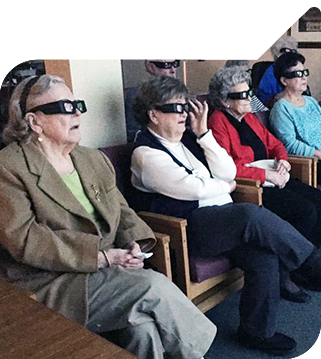Exploring the next frontier of innovation by way of virtual reality.
Have you ever wondered what it feels like to fly, or swim in the deepest depths of the ocean? Or what it looks like standing at the highest lookout point of the Grand Canyon, at the top of the Eiffel Tower, or a street corner from your childhood neighborhood? Have you ever wondered what it’s like to walk a mile in someone’s shoes?
Virtual Reality (VR) allows users to interact with their virtual “environment,” creating immersive experiences in 360° visual simulations. New cutting-edge VR applications are making inroads in a wide range of sectors and industries, from entertainment to healthcare. Immersive gaming, travel/tourism experiences, mental health and cognitive interventions, pain management, relaxation strategies, physical rehabilitation, and empathy training are just some of the ways that VR is making a difference today.
The Front Porch Center for Innovation and Wellbeing (FPCIW) has been actively exploring VR technologies to address the needs of older adults. Whether it is the satisfaction of checking off a lifelong “bucket list” wish, creating rehabilitation and mobility exercises by linking haptic feedback sensors, utilizing pain and stress reduction methods in skilled nursing settings, or reliving beautiful and happy memories that were once forgotten, virtual reality technologies offer the possibility of creating meaningful experiences and changing the way we deliver care.
Embodied Labs. Embodied Labs is using the power of VR storytelling to show caregivers, family members, staff, and students the experience of those facing aging challenges by assuming the perspective of those for which they provide care. Labs and modules allow viewers to embody a variety of experiences including end-of-life conversations, transitions of care, Alzheimer’s disease, and macular degeneration to develop more empathetic care. FPCIW is taking Embodied Labs’ VR kits on tour of the Front Porch communities to train skilled nursing and memory care staff. Click here to view the full Embodied Labs Pilot Report.
Rendever. Focusing specifically on curated VR content for older adult enrichment and engagement, Rendever offers a mobile VR platform with the ability for shared group viewing of experiences through wirelessly synchronized headsets. Older adults can go on group tours around the world with a “tour guide” facilitator, play games, reminisce visiting former addresses, and experience new activities. FPCIW has been exploring Rendever to assess its impact on older adult social engagement and wellbeing at the Front Porch Communities. This report summarizes a pilot study of Rendever completed at Sunny View Retirement Community.
Samsung Gear VR. FPCIW has internally used Samsung Gear VR headsets in a variety of applications such to investigate ways that VR can be an effective intervention for older adults in both clinical and non-clinical environments including skilled nursing, memory care, assisted living, and independent living.
Virtual Reality for Occupational Therapy. Virtual Reality (VR) is emerging as a potential tool in healthcare applications for stroke rehabilitation. To study how VR affects the neural mechanisms of learning and plasticity with a focus on the older adult population, FPCIW has collaborating with the USC Chan Division of Occupational Science and Occupational Therapy’s Neural Plasticity and Neurorehabilitation Laboratory to collect usability data from residents of Villa Gardens and OASIS community members.
Lumeum VR. Addressing the link between limited mobility and mental health conditions such as depression and anxiety, Lumeum “brings VR to those who need it most.” The company strives to develop an effective, creative intervention by guiding older adult users through novel virtual reality environments that many with limited mobility may not otherwise be able to experience. In collaboration with FPCIW, Lumeum piloted its solution with residents of Kingsley Manor.
FPCIW partnered with CDW Healthcare in 2019 to produce a comprehensive white paper on aging and virtual reality from the perspective of a senior living provider. This report features a matrix of VR solutions, summarizes key findings from FPCIW pilots, and highlights the benefits and opportunities of VR for older adults.
To provide an engagement opportunity for older adults shuttered in their homes during the COVID-19 crisis, FPCIW designed the Handheld VR Adventures toolkit. This guide provides a quick start and detailed instructions on using a simple and inexpensive VR viewer to help people use app-based virtual reality experiences readily available on their smart phones. Our sincere appreciation goes out to LeadingAge for their donation of the VR headsets to this project! The guide is free and downloadable below. NOTE: while it’s not necessary to have a headset to operate, it would be helpful to use an inexpensive Google Cardboard device to experience the VR programs.
Read the CDW-FPCIW VR in Aging Report.
Read the Embodied Labs Pilot Report.
Read the Rendever Pilot Report.
Browse our Virtual Reality Photo Gallery.
Download the Handheld VR Adventures Quick Start or full Handheld VR Adventures User Guide.
Download a PDF version of this story.


